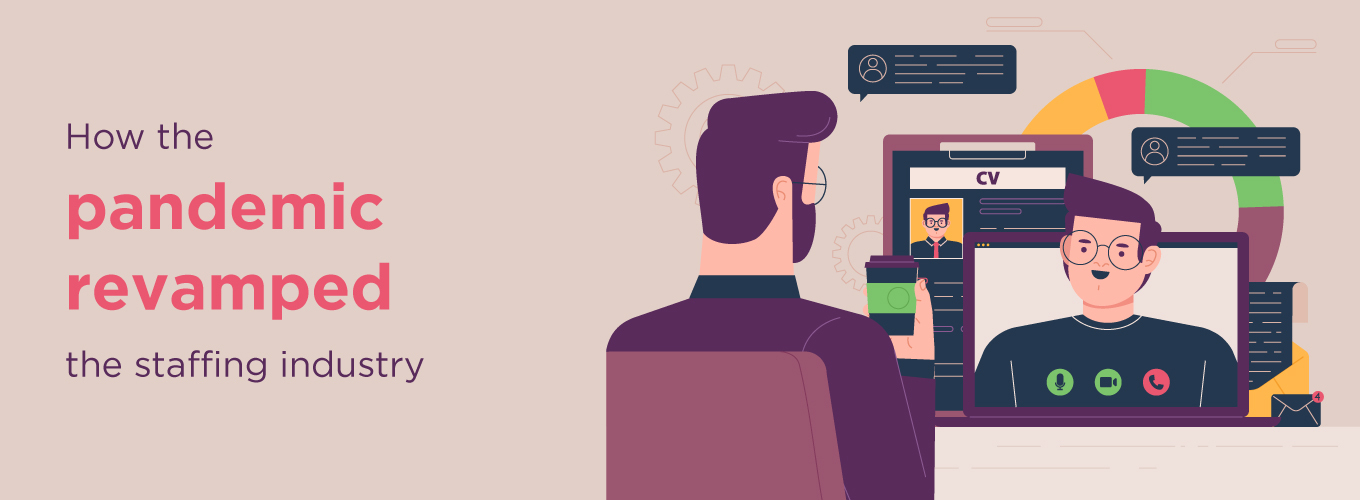How the pandemic revamped the staffing industry
Covid-19 disrupted businesses worldwide. Millions of jobs had to be dispensed with. And flexible, leaner, teams became the new norm.
While staffing firms too faced a lot of pressure to stay afloat, they are considered crucial to helping industry rebuild its workforce.
Table of Contents
Top findings of a global survey
A 2020 study of the staffing industry threw light on a few crucial trends.
Fundamentally, companies across the world are trusting their staffing partners to help sustain and rebuild their recruitment pipelines.
Three out of four hiring managers believe that their organizations will want to onboard flexible talent. 73 % of hiring managers felt that staffing firms will have a huge role to play in helping them find and recruit talent in the post-pandemic business world.
Upon analyzing the study’s findings and specifically the role of staffing firms – it is evident that these firms play a key role in business growth and profitability, which is, right from accessing candidate profiles, to shortening recruitment timeframes to seamless onboarding. Staffing firms are expected to provide businesses a helping hand in navigating through times of economic uncertainty.
How did staffing firms cope?
So, during the pandemic and beyond that, staffing firms had a tightrope to walk. Not only did they have to survive, they also had to help their customers grow. 86 % of staffing firms reported that they had to change to survive, and 81 % of these firms said the changes they had to make were related to embracing cost-saving opportunities.
Automation holds the key
The pre-pandemic way of hiring was costing more time and money. The conventional recruitment method relied on manual hiring through multiple touchpoints. This model had to be done away with and fast. HR managers have reported that they lose 14 hours each week trying to complete manual recruitment processes. A significant number, 28 %, spend 20 hours on such processes weekly. When these processes are automated they reduce the time invested phenomenally. For instance, candidate screening comes down by many, many, hours, to just a few seconds – giving the recruiter a set of qualifying resumes after sifting through several hundreds or thousands of resumes in record time.
AI rocks
Artificial intelligence (AI) plays a big role too in making recruitment simple and efficient. For instance, an AI job-description tool can pull information from a couple of billion data points to write a job description automatically. An AI job recommendation tool can post job descriptions automatically across platforms. AI helps assess and analyze competing jobs, match salaries and review candidate profiles – all in a jiffy! Some AI dashboards also review return on investment against talent acquisition costs. Managers can use these dashboards to understand what were the most effective and efficient ways in which candidates were identified and onboarded.
Staffing firms that embrace AI are more equipped for growth on the post-pandemic road. With many candidates grappling with lay-offs, the AI-based approach to recruitment gives staffing firms an edge over their peers to identify the right quality of talent and help their clients recruit them quickly.
Technology, particularly, AI helps prevent burnout in staffing firms and keeps teams lean, sharp and productive.
Staffing firms must champion D & I
78 % of hiring managers have reported in a global survey that they are inclined to make the workforce in their organizations more diverse and inclusive. To achieve this target, they are relying heavily on staffing firms.
So, staffing firms must ensure that their talent bank is diverse. They must champion their ability to support their clients’ requirements for D & I.
Positioning themselves this way will help them stand out in the recruitment market. And, it will make them value creators that enhance productivity and performance in the client marketplace.
Culture in staffing firms counts
During the pandemic, the number of professionals working remotely in staffing firms trebled. This number is expected to come down significantly in 2023 as people return to offices. But, staffing firms that give their employees the flexibility of hybrid work options will gain substantially from higher employee morale and resultant productivity. Firms must also champion equal opportunities for attracting and retaining people with diverse backgrounds and multiple skill sets.
In effect, staffing firms must ensure that they practice what they help their client organizations achieve. Keeping their culture vibrant, thriving and performance-driven, staffing firms can grow aggressively in the post-pandemic world.










